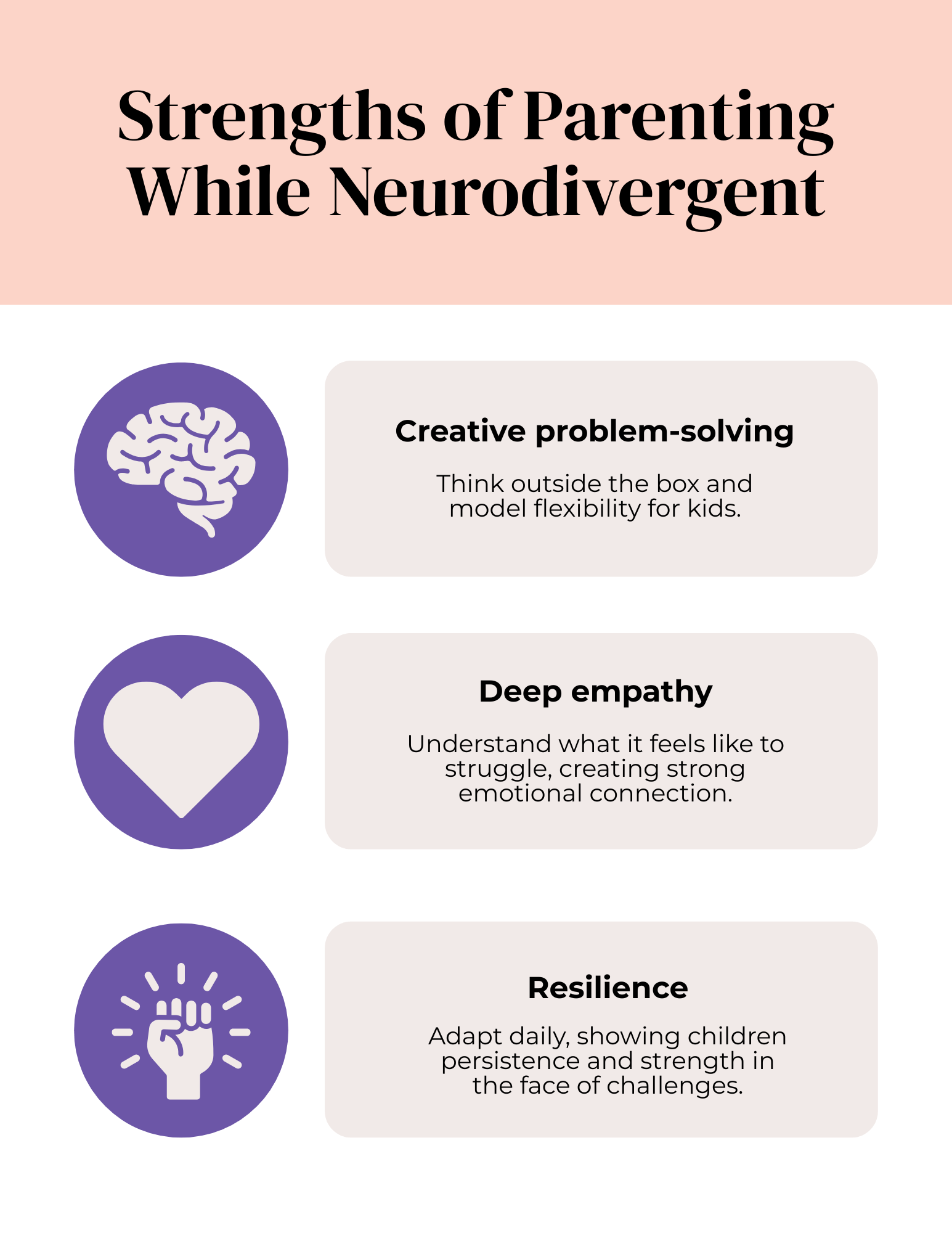Therapy for Neurodivergent Parents

At Sarah Cline & Associates, we understand folks who are struggling to manage their own neurodivergent brain while parenting children who are highly likely to also be neurodivergent.
In addition to the challenges of parenting, other challenges such as time management, organization, emotional needs, and managing frustrations can all compound and lead to parenting burnout.
Not only are our therapists very experienced in working with neurodivergences, compassion is at the center of everything we do.
Common Issues and Themes in Neurodivergent Parenting
Overstimulated by the noise and demands of having kids
Time management and task management
Managing childrens' emotional needs
Lack of confidence in parenting abilities
Managing anxiety & frustrations
Lack of self care
Feeling overwhelmed & burnt out
Expert Support for Neurodivergent Parenting
Our Approach
At our practice, we support neurodivergent parents with compassion and without judgment, creating a space where you can feel truly understood. Our approach blends therapy and coaching, giving you both the emotional support and the practical tools you need day-to-day.
Together, we’ll identify the areas where challenges feel the heaviest—whether it’s routines, stress, or family dynamics—and use a mix of parent training models and sensory-friendly parenting strategies to find what works best for you. Through collaboration and gentle trial and error, we’ll uncover techniques that fit your unique strengths. We also focus on reshaping negative self-perceptions, reminding you that struggles do not mean you are failing as a parent or an adult. Along the way, we’ll emphasize the importance of self-care and help you build sustainable skills to nurture both your well-being and your family’s. Neurodivergent parents
A Typical Session
During a 55-60 minute session, your therapist will listen closely without judgment or agenda. You are encouraged to share updates about your well-being, what has been working, and what hasn’t.
The therapist will ask questions and provide insights or feedback. Sessions are an open dialogue and may include:
- Breaking big things down into smaller pieces
- Strategies for executive functioning deficits
- Practicing organization & time management skills
- Discussing ways to manage intense emotions while managing them in your child
- Using cognitive strategies to reduce negative self-talk and low self-image
- Implement strategies to prioritize self-care
Our compassionate counselors are here to support you through your parenting journey, helping you to feel empowered and prepared for the challenges ahead.
Challenges Faced by Neurodivergent Parents
Executive Dysfunction
Tasks like keeping up with schedules, household chores, or daily routines can feel overwhelming or inconsistent.
Parenting Stress
Balancing your child’s needs with your own can lead to burnout, guilt, or constant pressure to “do it all.”
Emotional Regulation
Intense emotions may surface quickly, making it harder to stay calm and present during challenging parenting moments.
Daily Checklist for Neurodivergent Parents
Routines don’t have to be rigid—they can be flexible tools that make daily life feel a little more manageable. This checklist offers a simple starting point, and in therapy, we’ll work together to build a routine that fits your strengths, your family, and your unique needs.
Start the day with one consistent anchor (coffee, planner, stretch)
Use reminders—alarms, notes, or visuals
Keep meals simple and predictable
Plan a small daily parent–child connection time
Take short breaks and use timers for transitions
End the day with a calming wind-down routine

Sensory-Friendly Parenting Strategies
Every child (and parent) experiences the world through their senses, and for neurodivergent families, small adjustments can make daily life much smoother. Here are a few simple strategies you can try:
Create calm spaces
Set aside a quiet corner with soft lighting, cozy textures, or noise-reducing tools.
Use sensory breaks.
Build in short movement or relaxation breaks throughout the day to reset energy.
Adjust the environment
Minimize overwhelming sounds, lights, or clutter to help everyone feel more regulated.
Frequently Asked Questions
Is this for parents who are neurodivergent, parents of neurodivergent kids, or both?
Therapy for Neurodivergent Parents is specifically for parents who are neurodivergent themselves—whether you’re navigating executive function challenges, parenting stress, or emotional regulation. That said, we also offer therapy and support for neurodivergent children and teens, so your whole family can find care that fits their needs.
Feel Heard, Feel Safe, Feel Better - Contact Us

In-Person Sessions
2100 Manchester Rd. Suite 501-1
Wheaton, IL. 60187
Virtual Sessions
Throughout Illinois
